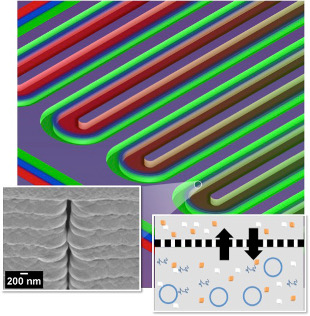 Parallel reactor and feeder channels (top), a single pore in the engineered membrane (left), and a diagram illustrating metabolite exchange across the membrane (right)OAK RIDGE NATIONAL LABORATORYResearchers from the Oak Ridge National Laboratory (ORNL) in Tennessee have created an artificial system to synthesize proteins without needing a cell culture. The group published its report last week (December 22) in Small.
Parallel reactor and feeder channels (top), a single pore in the engineered membrane (left), and a diagram illustrating metabolite exchange across the membrane (right)OAK RIDGE NATIONAL LABORATORYResearchers from the Oak Ridge National Laboratory (ORNL) in Tennessee have created an artificial system to synthesize proteins without needing a cell culture. The group published its report last week (December 22) in Small.
The bioreactor uses a reagent mix that combines E. coli cell extract, DNA encoding the gene for a green fluorescent protein, and the necessary metabolites. Instead of a living system, the new protein synthesis machinery uses long serpentine channels made of silicon integrated with an artificial membrane to combine materials between a “reactor” and a “feeder” channel. “This engineered membrane facilitates the exchange of metabolites, energy, and inhibitory species,” the authors wrote in their paper.
The team compared the protein synthesis of its dual-channel bioreactor to a reference mix incubated in microcentrifuge tubes and in single-channel bioreactors. In the microcentrifuge tubes, the reference mix was simply incubated on a shaker until it stopped producing proteins, leveling off at a final protein concentration of 325 μg/mL. ...


















